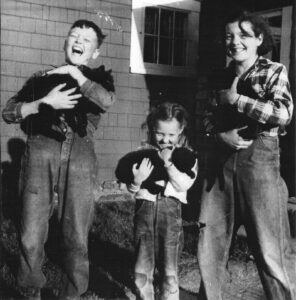Quit horsin’ around and use your horse sense to read all about horse idioms and sayings
He said I had to choose him or my horse. I miss him sometimes.
Cowgirl Spirit
“Does anyone know where I can find some road apples?”
Everyone else kept playing Bunco but I froze in my seat. I grew up in Lancaster County, Pennsylvania, where Amish and Mennonites mingled their horse and buggies in traffic. If you just washed your car you tried to avoid road apples dumped on the street by uncaring horses plodding along to get to the next stop. You were careful to walk around piles where the horses had been hitched to posts at stores, holding your nose if it was a fresh deposit. As a kid, it would crack you up if you followed a buggy in a car and the horse lifted its tail and shot out … road apples. It was twice as hilarious if you had another kid to hoot with you.
So I had to ask my friend, “What do you want with road apples?”
“I want to make earrings out of them.” I dropped my dice and tried to shake away the images popping into my brain. I laughed.
“Why would you want to do that?”
She wanted the rock-hard apples that fall from trees along streets here in Aiken. We all chuckled after we swapped road apple stories.
Equine Influence
Aiken’s love affair with horses is not unique. These beautiful creatures have not only affected history; equines have influenced our language to the point where we have many idioms and sayings from our partnership with them.
“Hold your horses” has a debatable origin; a line in Homer’s Iliad reads, “Antiochus, you drive like a maniac. Hold your horses!” The American derivation of this saying seems to come from “hold your hosses,” seen in print in the New Orleans Times-Picayune in 1844: “Oh, hold your hosses, Squire.” Also used in the USA artillery, it means wait until further orders.
One of the oldest English proverbs is, “You can lead a horse to water, but you can’t make him drink.” This idiom appeared in the Old English Homilies in 1175: “Hwa is thet mei hors wettrien the him self nule drinken.” These records were important in establishing the expansion of the English language. In 1602 a more modern interpretation was written in the play Narcissus: “They but bringe horse to the water brink, but horse may choose whether that horse will drink.”
As the 1500s rolled into the next century, William Shakespeare wrote As You Will (Twelfth Night) where a character named Maria says, “My purpose is indeed, a horse of that colour.” He based this bit of dialog (with a Shakespearean twist) on the axiom familiar to us as “horse of a different color”, which means a completely different matter than the subject at hand.
Yin and Yang
Horses have hair; birds have feathers. Take two random words and mash them together to form a word that makes sense.
Horsefeathers!
If something isn’t worth considering, you could use “nonsense”, “hogwash”, or “baloney”, but there’s something about “horsefeathers” that says it so well. Written as one or two words, it is an American original made popular by the 1932 movie Horse Feathers featuring the Marx Brothers.
Practical thinking is often called “horse sense”, another American creation. Cowboys working herds in the West made up in wisdom what they lacked in formal education — they had horse sense. James Kirke Paulding wrote in his 1832 novel Westward Ho!:
I’m for Dangerfield, though he hasn’t got a white pocket handkerchief, and though he can’t play the piane [sic]. He’s a man of good strong horse sense.” Although horses are not in the top ten charts of animal intelligence, horse sense may be based on the fact that a horse will return to his barn every chance he gets.
W.C. Fields said, “Horse sense is good judgment that keeps horses from betting on people.”
More feed for fodder
One of the oldest horse idioms was penned way back in the late 4th century by St. Jerome when he wrote an introduction to his translation of the New Testament of the Christian Bible: “Equi donate dentes non inspicuintur:” “don’t look a gift horse in the mouth.” In other words, don’t be ungrateful when given a present by determining its worth. (Just re-gift.)
One important factor in calculating the value of a horse is its age, which is determined by examining its teeth. As horses mature they develop teeth that change shape and move toward the front of the mouth (which brings to mind the saying about aging “long in the tooth”). Between eight days and eight months horse teeth push through the gums; four permanent front teeth erupt at around three years of age. Permanent teeth are darker and longer than the baby teeth. A full mouth of teeth appears by the time the horse is five years old.
The saying a dark horse evolves from a racing term for an unknown or undervalued trotter that won a race. A dark horse is a person who is fairly obscure or behind in popularity and then wins a competition. The earliest written reference to this idiom is found in Benjamin Disraeli’s 1831 novel The Young Duke, written before he became prime minister of the United Kingdom: “A dark horse, which had never been thought of … rushed past the grand stand in sweeping triumph.”
In the late 1500s the word “horse” was used to describe things that were strong or big (like the word horseradish). Rough or boisterous fun was deemed “horseplay”. Today horseplay also means participating in unsafe pranks, reckless driving, and pressure to take part in risky shenanigans.
Carts, Chargers, and Charley
In 16th century England if someone was doing things in the wrong order, he was “putting the cart before the horse.” Hundreds of years earlier, other countries had similar sayings.
Sometimes the meanings of idioms change. In the 1780s, being told you’re on a “high horse” was a compliment since only royalty and soldiers sat on tall or high, powerful chargers (war horses). After the revolutions in the late 1700s, the common people lost respect for the royals and viewed them as uppity and haughty, or as people who needed to come down from their high horses. Today it is used when talking about persons who are arrogant and inaccessible.
Lame race horses were dubbed “Charley” in the 1850s. Just before the turn of the next century, an old horse named Charley was used to drag a roller over the infield dirt in the Chicago White Sox ballpark. His poor achy muscles had gotten so stiff that he had trouble completing his job. When ball players got cramps they thought of old Charley and called the painful condition in their legs a “Charley horse.”
The Last Lap
- “Eat like a horse” and you’ll be packing down twenty pounds of food.
- People raring to go are said to be “chomping at the bit” — impatient horses can be seen chewing on their bits.
- A “one horse town” is small and inadequate.
- “Beating or flogging a dead horse” gets you the same results as, well, talking to a brick wall.
- “Changing horses in midstream” refers to making new plans or changes after an activity has begun.
- A “dog and pony show” is a ruse to impress you.
- If you “back the wrong horse,” you’re a loser.






